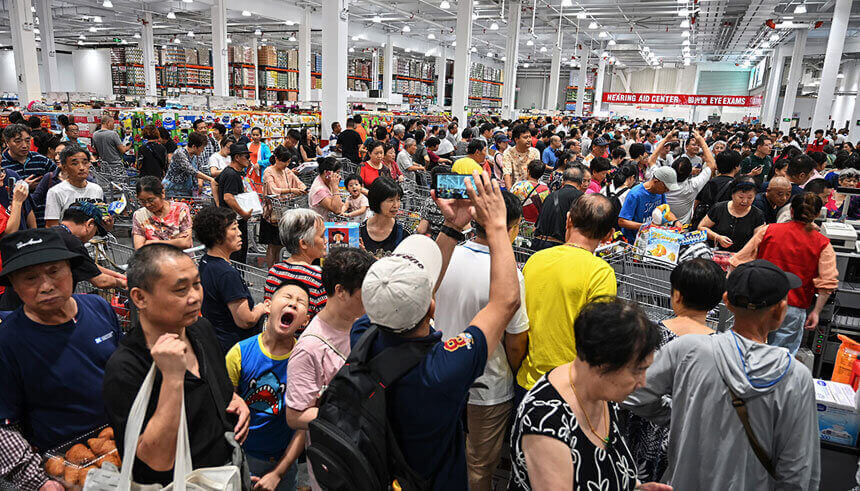US-Asia Business
US-China Market Watch: Trade War, Tencent Music, Costco China
By Angela Bao

Your monthly roundup of the latest US-China business and industry news.
Future of U.S.-China trade talks unclear
The status of U.S.-China trade negotiations is up in the air. President Donald Trump said that China had called the U.S. delegation to further discuss trade talks, but Chinese state media contradicted Trump’s remarks soon after, stating that the two sides were only in contact on “a technical level.” However, Reuters reports that China’s Foreign Ministry recently said that both sides were “maintaining effective communication” but did not elaborate further. The U.S. and China have scheduled high-level trade talks for September, but the recent remarks cast doubts over whether those discussions will still happen.
After China had announced retaliatory tariffs on $75 billion of U.S. goods, which include resuming tariffs on automobiles and auto parts, Trump tweeted out that he was raising existing tariffs on $250 billion worth of Chinese goods from 25 percent to 30 percent. The tariff increase is set to go into effect on October 1. After China made its tariff announcement, Trump also issued a tweet “ordering” U.S. companies to cease doing business in China and to bring their manufacturing back stateside.
Trump also raised the planned tariffs on $300 billion of Chinese goods, which went into effect on September 1, from 10 percent to 15 percent. These tariffs will affect a wide range of consumer products, including apparel, consumer electronics and whiskey.
Tencent Music faces antitrust probe
Tencent Music Entertainment Group is facing an antitrust probe by China’s State Administration of Market Regulation into its dealings with record labels Universal Music Group, Sony Music Entertainment and Warner Music Group. Tencent Music is controlled by Chinese tech giant Tencent Holdings but is also backed by Warner and Sony.
All three companies have sold to Tencent Music the exclusive rights to large portions of their music catalogues. Tencent then sublicenses out those songs to smaller competitors, a practice those competitors have deemed unfair because it costs significantly more to license from Tencent than it does to license directly from the music labels. Other Chinese tech giants like Baidu, ByteDance and Alibaba all license music from Tencent. The antitrust probe could prove to be a serious blow to Tencent, which dominates the Chinese online music industry that is expected to be worth $30 billion by 2023.
Costco’s first China store shuts down due to massive crowds
U.S. retailer Costco opened its first store in China, but had to close it early on its first day due to the high volume of shoppers. Costco has had an online presence in China for five years, through its partnership with e-commerce giant Alibaba, but their Shanghai store opening marks a significant investment into the Chinese market.
Despite the tensions from the U.S.-China trade war, the frenzy around Costco’s opening was unprecedented, with reports saying that there were three-hour waits just to get into the parking lot. However, despite the initial optimism, Costco still has to compete with other U.S. retailers like Walmart, as well as domestic Chinese giants Alibaba and JD.com.
China’s video game publishers set sights overseas
As the Chinese domestic market becomes more crowded and regulated, Chinese gaming companies are turning their focus to overseas markets, where they are quickly gaining market share. Google and mobile analytics company App Annie released a report that said that Chinese mobile game publishers saw a 60 percent increase over the past two years in overseas consumers’ payments from Apple’s App Store and the Google Play Store. Sales reached nearly $4 billion in the first half of 2019, and games by Chinese publishers were downloaded nearly 2 billion times, almost double the 1.1 billion downloads in the first half of 2017.
Although Chinese game developers dominated emerging markets, they still only make up a “relatively small percentage” in mature markets like the U.S., Japan and the U.K. However, their global popularity is growing rapidly.
Goldman Sachs and Ping An back California AI startup
Goldman Sachs, Ping An Global Voyager Fund and other companies have invested $72.5 million into California-based artificial intelligence startup H2O.ai. H2O.ai makes software that helps companies that don’t have the resources, such as time or a skilled workforce, to adapt to the changing AI environment. They offer “recipes” that can help companies automate the building, training and deploying of models that can be used to pull insights from company data, or they can help companies customize their own models. H2O.ai’s current customers include companies like Capital One, Wells Fargo and Booking.com.
Sign up for the Reach Further Newsletter
We’ll keep you in the know about the latest US-Asia business news and trends.
Suscríbase al boletín Reach Further
Lo mantendremos informado sobre las últimas noticias y tendencias comerciales entre Estados Unidos y China.

